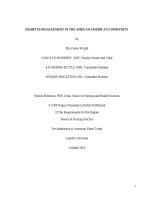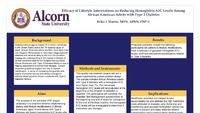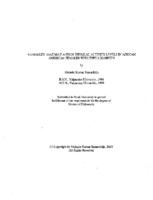| dc.contributor.advisor | Morrisey, Carolyn | en |
| dc.contributor.advisor | Suttle, Catherine M. | en |
| dc.contributor.advisor | Singleton, Monnieque | en |
| dc.contributor.author | Porter-Wright, Ella | en |
| dc.date.accessioned | 2016-12-07T22:21:26Z | |
| dc.date.available | 2016-12-07T22:21:26Z | |
| dc.date.issued | 2016-12-07 | |
| dc.identifier.uri | http://hdl.handle.net/10755/621162 | |
| dc.description.abstract | <p><strong>Purpose: </strong>The purpose of this project was to explore the effectiveness of utilizing an evidence based diabetes tool kit and a physical activity program in the management of A1C levels >8.0 of African American adult patients.</p>
<p><strong>Data sources: </strong>A sample of 25 African American adult patients ages 21-75 with Type 2 Diabetes Mellitus were recruited from a local Community Health Center for this cross-sectional study design. The data has been collected using administrative data from electronic medical records and utilizing an evidenced-based diabetes tool kit from the American Diabetes Association and a physical activity program which consists of a thirty-minute aerobic walking exercise.</p>
<p><strong>Conclusion: </strong>The project participants consisted of 13 African American women and 12 African American men. The results suggest patients are more likely to adhere to checking their blood sugars, manage their diets, and participate in moderate physical activity when they have access to resources and one on one discussions with their provider. The participation and adherence to the project guidelines were met 95% among the females and 80% among the male participants. The results conclude that A1C levels can be significantly decreased using the diabetes tool kit in conjunction with physical activity if there is consistency in daily routine and adequate follow up with provider.</p>
<p><strong>Implications to practice: </strong>African Americans are disproportionately impacted by the adverse effects of diabetes mellitus. Cost effective strategies must be identified to manage their diabetes and A1C levels. This project addresses strategies to fill gaps in practice for African Americans who lack economic resources and provider interest in helping to manage their diabetes mellitus.</p> | en |
| dc.description.sponsorship | Singleton Health Center | en |
| dc.format | Text-based Document | en |
| dc.language.iso | en | en |
| dc.subject | African American | en |
| dc.subject | Diabetes | en |
| dc.subject | Physical Activity | en |
| dc.subject | A1C Levels | en |
| dc.subject.mesh | Diabetes Mellitus | en |
| dc.title | Diabetes management in the African American community | en |
| dc.type | DNP Capstone Project | en |
| dc.rights.holder | <p>
All rights reserved by the author(s) and/or publisher(s) listed in this item record unless relinquished in whole or part by a rights notation or a Creative Commons License present in this item record.
</p><p>
All permission requests should be directed accordingly and not to the Sigma Repository.
</p><p>
All submitting authors or publishers have affirmed that when using material in their work where they do not own copyright, they have obtained permission of the copyright holder prior to submission and the rights holder has been acknowledged as necessary.
</p> | |
| dc.description.note | This work has been approved through a faculty review process prior to its posting in the Virginia Henderson Global Nursing e-Repository. | en |
| thesis.degree.grantor | Capella University | en |
| thesis.degree.level | DNP | en |
| dc.primary-author.details | Ella Porter-Wright, DNP FNP-BC | en |
| thesis.degree.year | 2016 | |
| dc.type.category | Full-text | en |
| dc.evidence.level | N/A | en |
| dc.research.approach | Translational Research/Evidence-based Practice | en |
| dc.subject.cinahl | Blacks | en |
| dc.subject.cinahl | Hemoglobin A, Glycosylated | en |
| dc.subject.cinahl | Hemoglobin A, Glycosylated--Analysis | en |
| dc.subject.cinahl | Diabetes Mellitus--Therapy | en |
| dc.subject.cinahl | Therapeutic Exercise | en |
| dc.subject.cinahl | Physical Activity | en |
| dc.description.reviewtype | None: Degree-based Submission | en |
| dc.description.acquisition | Self-submission | en |





